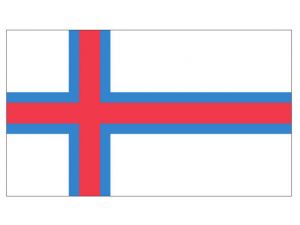Language/Faroese/Grammar/Personal-Pronouns
Personal Pronouns
When learning a new language, personal pronouns are some of the first words you learn. In Faroese, personal pronouns are used often and play an important role in constructing sentences.
There are two forms of personal pronouns in Faroese, singular and plural. They also have subject and object forms. In this lesson, we will learn the different forms of Faroese personal pronouns.
Singular Personal Pronouns
Singular personal pronouns are used when referring to one person or thing.
| Faroese | Pronunciation | English |
|---|---|---|
| Eg | ayg | I / me |
| Tú | too | You / You (informal) |
| Hann | hahn | He / Him |
| Hon | hownn | She / Her |
| Tað | tah | It |
Examples:
- Eg er Faroese. (I am Faroese.)
- Tú ert frá Danmark. (You are from Denmark.)
- Hann elska Faroe Islands. (He loves Faroe Islands.)
- Hon fær eina góða karakter. (She gets a good grade.)
- Tað er stórt. (It is big.)
Note that "Tað" can also be translated to mean "that" or "those" depending on the context.
Object form: In Faroese, the object form of personal pronouns is different from the subject form. The object form of a personal pronoun is used when the pronoun is the direct or indirect object of the verb in the sentence.
The object forms of singular personal pronouns are as follows:
| Faroese | Pronunciation | English |
|---|---|---|
| Meg | mayg | Me |
| Tær | taher | You (informal) |
| Hann | hahn | Him |
| Hana | hownnah | Her |
| Tær | taher | It |
Examples:
- Hann sær meg. (He sees me.)
- Hana elskar at gera mat til tær. (She loves to cook for you.)
- Tað tekur tíð at venja hann. (It takes time to get used to him.)
- Hetta gefur mær frið í huganum, men ikki tær. (This gives me peace of mind, but not you.)
- Meg dámar ikki hesa bók. (I do not like this book.)
Plural Personal Pronouns
Plural personal pronouns are used when referring to more than one person or thing.
| Faroese | Pronunciation | English |
|---|---|---|
| Vit | veet | We / Us |
| Tír | teer | You (formal or plural) |
| Teir | tair | They / Them (masculine or mixed gender) |
| Tær | taher | They / Them (feminine) |
| Tey | tay | They / Them (inanimate object) |
Examples:
- Vit taka eina góða tíð í hesum. (We take a good time in this.)
- Tír eru áðurkend í hesum. (You are recognized in this.)
- Teir elska høgtíðirnar. (They love the holidays.)
- Tær eru á skúla í dag. (They are at school today.)
- Tey eru stórir og rúmligir. (They are big and spacious.)
Object form: The object forms of plural personal pronouns are as follows:
| Faroese | Pronunciation | English |
|---|---|---|
| Okkum | o-koom | Us |
| Tykkum | tih-koom | You (formal or plural) |
| Teir | tair | Them (masculine or mixed gender) |
| Tær | taher | Them (feminine) |
| Tey | tay | Them (inanimate object) |
Examples:
- Vit fegnast um okkurt nýtt hjá okkum. (We are happy about something new for us.)
- Tú ferst í búðina fyri tykkum. (You go to the store for you (plural).)
- Børnini eru so glað í felagsskap við teir. (The children are so happy in company with them (masculine or mixed gender).)
- Hetta er gott fyri tær, men ikki fyri tey. (This is good for them (feminine), but not for them (inanimate object).)
- Okkara verða tngað fyri tey. (Our stuff will be moved for them (inanimate object).)
Remember, in Faroese the object form is used when the pronoun is a direct or indirect object in the sentence.
That is all for personal pronouns in Faroese. Make sure to practice using them frequently, as they are a crucial part of constructing sentences. In the next lesson, we will learn about the Faroese verb "vera" (to be).

